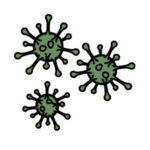 About coronavirus (COVID-19)
About coronavirus (COVID-19)

This information was current at the time this page was last updated on: 2 March 2021, 11.47am
What is coronavirus (COVID-19)?
Coronaviruses are common across the world. COVID-19 is a new strain of coronavirus.
The most common symptoms are a continuous cough and/or a high temperature (fever). People may also lose their sense of taste or smell. For most people, COVID-19 will be a mild infection.
Read an Easy Read on how to stop the spread of coronavirus
Who is more vulnerable?
Anyone can get coronavirus. However, some people are more vulnerable to getting severe symptoms.
- people who are clinically extremely vulnerable
- people who are clinically vulnerable
Clinically extremely vulnerable
- Adults with the following conditions are automatically deemed clinically extremely vulnerable:
- solid organ transplant recipients
- those with specific cancers:
- people with cancer who are undergoing active chemotherapy
- people with lung cancer who are undergoing radical radiotherapy
- people with cancers of the blood or bone marrow such as leukaemia, lymphoma or myeloma who are at any stage of treatment
- people having immunotherapy or other continuing antibody treatments for cancer
- people having other targeted cancer treatments that can affect the immune system, such as protein kinase inhibitors or PARP inhibitors
- people who have had bone marrow or stem cell transplants in the last 6 months or who are still taking immunosuppression drugs
- those with severe respiratory conditions including all cystic fibrosis, severe asthma and severe chronic obstructive pulmonary disease (COPD)
- those with rare diseases that significantly increase the risk of infections (such as severe combined immunodeficiency (SCID), homozygous sickle cell disease)
- those on immunosuppression therapies sufficient to significantly increase risk of infection
- adults with Down’s syndrome
- adults on dialysis or with chronic kidney disease (stage 5)
- women who are pregnant with significant heart disease, congenital or acquired
- other people who have also been classed as clinically extremely vulnerable, based on clinical judgement and an assessment of their needs. GPs and hospital clinicians have been provided with guidance to support these decisions
People who are classed as clinically extremely vulnerable should be especially careful to follow the rules and minimise their contact with others. They should continue to wash their hands carefully and more frequently than usual, and maintain thorough cleaning of frequently touched areas in their home and/or workspace.
For staff members who are classed as clinically extremely vulnerable, a risk assessment will have taken place on your return to work after shielding ended. Please contact your line manager for more information.
Clinically vulnerable
Clinically vulnerable people are those who are:
- aged 70 or over (regardless of medical conditions)
- under 70 with an underlying health condition listed below (that is, anyone instructed to get a flu jab each year on medical grounds):
- chronic (long-term) mild to moderate respiratory diseases, such as asthma, chronic obstructive pulmonary disease (COPD), emphysema or bronchitis
- chronic heart disease, such as heart failure
- chronic kidney disease
- chronic liver disease, such as hepatitis
- chronic neurological conditions, such as Parkinson’s disease, motor neurone disease, multiple sclerosis (MS) or cerebral palsy
- diabetes
- a weakened immune system as the result of certain conditions or medicines they are taking (such as steroid tablets)
- being seriously overweight (a body mass index (BMI) of 40 or above)
- pregnant
People who are clinically vulnerable should be especially careful to follow the rules and minimise their contact with others. They should continue to wash their hands carefully and more frequently than usual, and maintain thorough cleaning of frequently touched areas in their home and/or workspace.
Shielding
Shielding is a measure to protect clinically extremely vulnerable people by minimising interaction between those who are extremely vulnerable and others.
This means that those who are extremely vulnerable should not leave their homes, and within their homes should minimise all non-essential contact with other members of their household. This is to protect those who are at very high risk of severe illness from coronavirus (COVID-19) from coming into contact with the virus.
Read the Government’s Easy Read on shielding
For more information on the shielding guidance, visit the Government’s website.